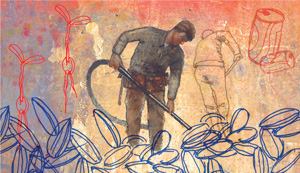Until he received a call from John Fagnioli, his electrical sub, with a big problem. Tom took a deep breath after receiving the news. “John, I empathize with your situation—your supervisor and your three main guys are out with the flu—but I’ve got to maintain my schedule,” he told him. “ Can’t you break anybody free to finish up the electrical trim install? Mostly it’s just can trims and other simple fixtures.”
Tom and John had a great working history of more than 16 years, so John relented. “OK, Tom, I’ll send over some of my commercial guys on Saturday and they’ll get the project knocked out,” he promised. “That’ll be great,” Tom said with relief.
That Saturday, Tom and Robb were both out of town, attending their kids’ sporting events. At 3:30 p.m., Tom could barely hear his cell phone ringing over the noise of the game; he answered it just before the call rolled over into voice mail. It was Jan Clancey—and she was livid. Angry Tom wasn’t on site, mad at the electricians, and mostly upset about what she discovered when she entered her nearly completed home at 3:25 p.m., she unleashed her complaint.
Sunflower seed shells were all over her house: on the floors, walls, cabinet faces, countertops, sinks—on nearly every surface in every area where the electricians were working. Jan had even seen two men in action—from their ladders, they were cracking, eating, and then spitting out the shells as they hung the fixtures. The discarded shells were wet and tacky with saliva, sticking to everything in sight.
As it turns out, this particular crew worked exclusively on commercial/industrial jobs, where such behavior is tolerated. They don’t work in finished interior areas, so they were accustomed to their seed debris getting lost amid the other dirt and trash that accumulates as construction proceeds.
Epilogue. Tom calmed Jan down and agreed with her that the electrical crew had behaved stupidly, without respect or common sense. Jan felt—and rightly so—that for a full day, the workmen had been essentially spitting on every interior finish of her home. To make amends, Tom had every surface of the home disinfected and then had several areas repainted.
Phelps Custom Homes had never anticipated an incident such as this. Its jobsite rules dictate no smoking, chewing tobacco, alcohol, or loud music. Now it would have to add “No Sunflower Seeds” to its jobsite signage.
This case, of course, begs a larger question: Should any food and drink be allowed on site when a home is in the finishing phase? Bear in mind that most sodas contain phosphoric acid, which can easily stain, discolor, and partially dissolve base surfaces such as tile grout, concrete, brick, and unfinished wood.
It’s hard to understand how any crew could be so insensitive, uncaring, and disrespectful. No wonder our industry lacks respect when compared with other professions. Given what happened, do you think Phelps Custom Homes deserved the completion bonus? Let me know.—Dennis A. Dixon is an author, contractor, and speaker with 25 years of experience in the building industry. He can be reached at dixven@aol.com.



